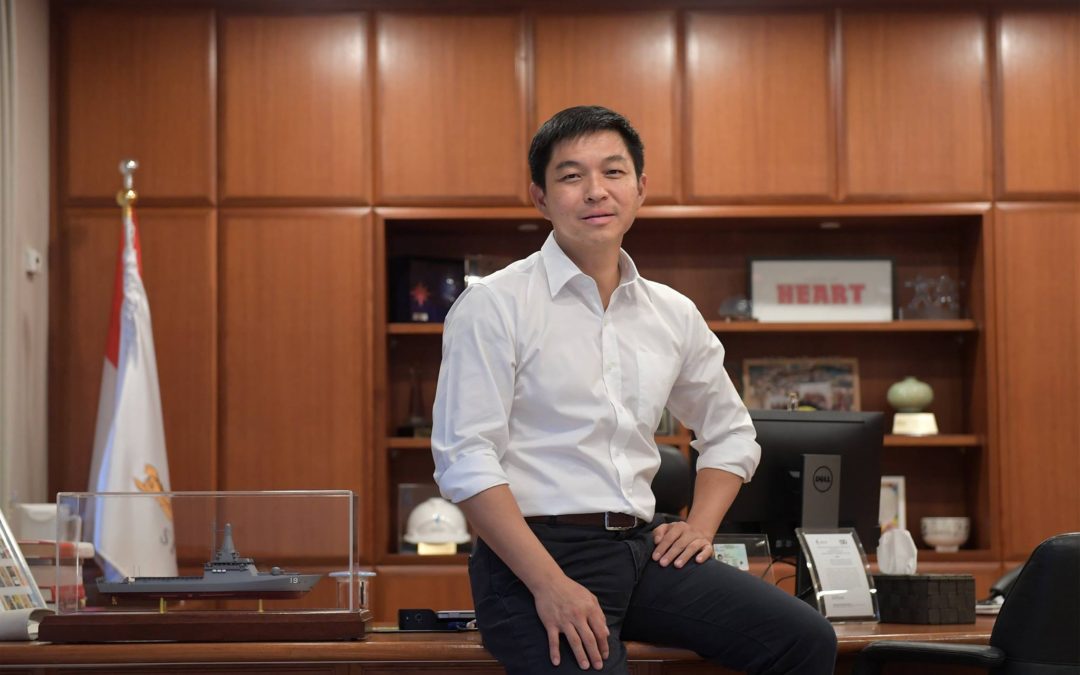TMC had the wonderful opportunity of having Mr. Tan Chuan-Jin grace the the finale of TMC Academy — a three-part series workshop jointly organized with Compass@Campus. Mr. Tan discussed his thoughts on leadership and also took questions from the floor.
In his speech, Mr. Tan surveyed the crowd to see if anyone had the confidence to articulate their leadership philosophy in a concise manner. As he astutely pointed out, while many people aspire to be leaders, few have thoroughly inculcated their philosophy into their daily actions. However, these day-to-day practices are often what causes others to gravitate towards leaders that they can identify with.

He also went on to mention how we should determine what we believe to be the silver bullet of success. For him, he believe its people, as people have been and will remain the driver of solutions and deliverer of outcomes. In order to continue societal progress, being able to motivate people as a whole to go the extra mile is of key importance. However, in today’s society, the natural inclination is to be focussed on yourself. This ties in with how the environment around us is dictated by near-term successes such as election cycles forcing politicians to run on populist campaign ideals which are often individualistic as compared to being beneficiary to the society in the long-term.

Mr. Tan used the Singapore government as an example, illustrating how the current ruling party would easily have the option to lower taxes and increase subsidies in order to obtain short-term support from its voters. Given Singapore’s current substantial foreign reserves, such a trend could easily be sustainable for the foreseeable future. However, the government does not do that as while it is the easier option, it may not necessarily be the right thing to do.

Finally, Mr. Tan concluded by mentioning how the value of leadership comes from being able to convince individuals to do the right thing even if it’s not an easy choice. At the end of the day, leadership comes down to trust, especially from a subordinate and peer level. While many individuals have been able to get away with superficially pleasing their superiors, the true judge of your capability as a leader will come from your subordinates who witness your day to day actions and determine whether you are someone worth following. If you are an individual who constantly shows through your actions that you are willing to sacrifice for the team, you will be able to gain their respect.
Q&A with Mr. Tan Chuan-Jin

Do you have any anecdotes about the struggles and steps you have taken towards discovering your purpose and defining what success means to you?
TCJ: I have always tried to understand the bigger picture and I let that guide the way I do things.
For example, during my time in the army, it used to be that units would be ranked from best to worst on a points based system. This created an ultra-competitive atmosphere because no one could anticipate the performance of other teams and no one wanted to be last either. However, I thought that would not be the best system because it meant a lot of time was focussed on IPPT training when this time could be better utilized elsewhere. So, I decided to introduce a banding system which would give points to units as long as they hit the benchmark needed which did achieve the intended purpose which was to free up time.
It is important to push the boundaries with reason but also be willing to bear responsibility for the risk that you are undertaking. This is often made easier if you actually understand the reason you’re doing what you’re doing (i.e. how it fits into your bigger purpose). We usually don’t take risk because we are worried that it will come back to haunt us. But if we truly believe in what we do, the risk we take will become justifiable to yourself and will free you up to do things you previously were not able to do.

What was your definition of success during your time in the army and how have things changed since then?
TCJ: I did not have a clear idea of success at that point in time but it has evolved with time and I now have more clarity. One of the trigger points that I had was an SAF course that I did badly for, which caused me to question more about how I defined success.
At the end of the day, I think my definition of success is very tied to my role in public service. During my time in the army, it was about how I trained my men to be ready to defend the country as well as how to be take responsibility of their lives as individuals. As I approach 50, I have also personally begun thinking about my own internal compass and direction in life.

How do you reconcile the tradeoff between success and helping others?
TCJ: There is no doubt that Singapore is a competitive environment founded on meritocracy. However, it is up to you as a person to decide how you want to lead your lives. I had the choice to stay and increase my chances of being promoted from Colonel to Brigadier General but instead chose to leave and study because I did not want to dictate my life based on positioning myself for the best job.
We can make excuses and blame the system, but the system does not stop us from choosing how we want to lead our life. Thus, when thinking about how to navigate the real world, I think that we need to decide whether to play the long or the short game.
How do you define values and who are your role models?
TCJ: I do not have role models but not because there is no one to follow. I believe more in learning from observing different leaders. For example, a bad leader could give me as much to learn as a good leader because it shows me what I should not follow and why I may not have responded as well to such a leadership style. For me, in terms of leadership style, I try to articulate what I believe and what I intend to achieve up front so that even if others do not agree with me I have at least concisely communicated my intentions.

Did you have any leadership positions in school and how did those experiences impact you?
TCJ: Although I had leadership positions in school, I barely knew what I was doing. To be honest, as I look back, I wonder what I really did. I do not think I was particularly effective but definitely learnt most from my failures. I struggled in OCS but I learnt you cannot mope, you have to just suck it up. Learn to will yourself to deal with the realities of life. As life unfolds, you learn to compartmentalise so that things do not drag you down. Coming to terms with disappointments early on helps you recalibrate to what is important. I told myself after all my failures to just do what you want to do. The support and friendship was what really mattered at the end of the day. You need a sheer force of will to lift yourself out of the rut, internalize and move on.

How should TMC continue to inspire others to give back?
TCJ: You should lead by example and show that you are willing to put in the time. You still have to do well, but you have to communicate your beliefs squarely to individuals. Live your life based on what you think is important even though you may miss out on other things. It’s about who you are and your values.
How do you inculcate values?
TCJ: We should stop short of preaching and let the individual decide. But from parents’ perspective it is more important to instill values at a young age as children can decide from themselves after a certain point. It is more important to have clarity on the values you have for yourself, but elocuting your values and beliefs to others does help you develop a clearer sense of your values as well.

Do you have any advice for undergraduates in the room?
TCJ: There may seem to be a lot of uncertainty and disruptions around, but in reality these disruptions should be viewed as opportunities because we are equipped with skill sets. Singapore still continues to be a destination for individuals to come and participate in the economy.
Many people have described millennials as – PMET – pampered mediocre expensive and timid – but you should not take that to heart. Do not underestimate the difference you can make in building a better society that is premised on thinking of others.





Recent Comments